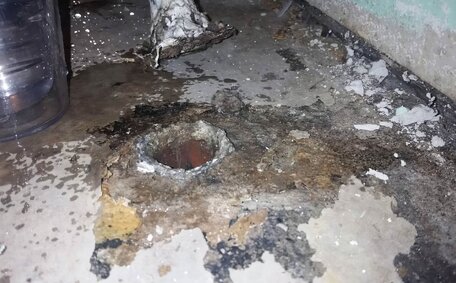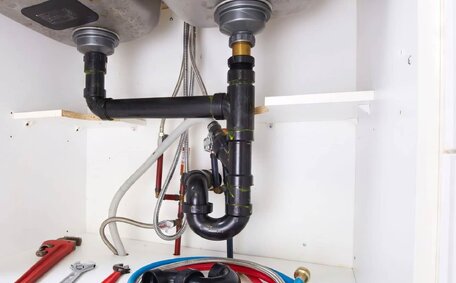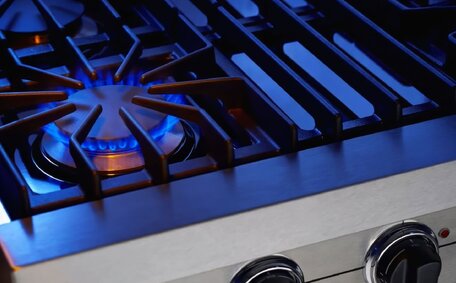Understanding Blocked Drains: Common Causes
Everyday household items can cause your drains to become obstructed. Bathroom drains typically become blocked by hair and soap scum, and kitchen sinks clog from fats, oils, and food particles. Leaves, dirt, and other debris are one most common culprits blocking outdoor drains.
As hair washes down the drain, it tangoes together with soap scum and sticks to your pipe interiors. Pour hot water through the pipes to effectively unblock drain accumulations.
Within your kitchen sink drain, fats, oils, and grease set onto the pipe surfaces when flushed down, making it imperative to get your drainage cleared. Decomposing food remnants in pipes can cause blockages. Prevent kitchen sink blockages by using drain baskets to catch stray food debris and avoid pouring fats or oils down the sink.
Gutters and your outside drain commonly fill with leaves, sticks, and dirt during storms. Such accumulation obstructs water flow, prompting homeowners to find ways to unblock outside drains. Regularly clearing debris can prevent drain blockages, reducing the need for unblocking methods and keeping outside drain covers clear.
Safety First: Taking Precautions Before Unblocking a Drain
When attempting to unblock outside drain blockages, safety should always come first. Don protective rubber gloves, goggles, and appropriate clothing to protect yourself from hazardous substances spilling out your drains. Ensure the area is well-ventilated and have a bucket of water nearby to dilute and rinse away any chemicals.
Secure long hair and loose garments to minimise hassle as you focus intently on how fix blocked drain concerns efficiently. Work methodically with appropriate tools to detect obstructions and prevent pipe damage.
Guarantee sufficient illumination for crisp visibility as you wield your implements under sink spaces or around pipe domains. Use a sturdy drain rod, a reliable drain auger, and handle a drain snake carefully to prevent pipe damage and skin punctures.
The unblocking process can happen with risks of flooding, chemical contact, or damage to pipes. Should you be uncertain about unblocking at home and tools are absent, it might be prudent to call plumber professionals or browse your local hardware store. When it’s time to unblock your plumbing, undertaking convoluted repairs on your own can result in significant damage.
Trying Simple DIY Techniques: Plungers and Boiling Water
You can use your plunger to effectively dislodge a minor clog. Squirt in a few drops of dish soap – this helps break up the build up of grease. Place the cup plunger over the drain and pressurisedly plunge, adjusting the force as necessary.
Start by half-filling your basin since hot water alone might dissolve minor blockages.
If the problem persists, remove the plunger and meticulously introduce boiling water into the affected conduit (approximately 4-5 cups).
Replace the plunger immediately and repeat the process to shift any dislodged residue.
To ensure safety, try using closed-toe shoes, gloves and eye protection when delving into work, recognising how a simple mistake with a drain can create larger issues. When it’s time to recognise more extensive blockages as efforts fall short in improving drainage, contemplate professional attention.
Using Natural Home Solutions Like Baking Soda and Vinegar
Prior to embracing abrasive chemical cleaners, think about attempting some hot water mixed with natural home concoctions. An easy method is mixing baking soda and vinegar, sending a fizzing chemical reaction down your pipes that is gentle on your hot water systems by breaking up clogs.
- Start your drain unblocking process by pouring half a cup of baking soda down the clogged drain.
- Follow with hot water, then one cup of warm white vinegar to activate the fizzy reaction. Caution: vinegar may bubble up!
- Seal the drain for a few minutes and watch the reaction help loosen the clog.
- Flush the drain with warm water to remove all debris and confirm the method’s effectiveness. Use a plunger as necessary to clear any remaining debris.
Implementing the baking soda and vinegar tactic monthly significantly benefits your plumbing system, forestalling obstructions. It helps scrub away grease and grime before major blockages form. When poured down outdoor drains, the solution cleans leaves and debris that often amass.
When to Use Chemical Drain Cleaners
A powerful caustic soda cleaner can break down the stubborn blockages in your drains. However, caustic chemicals can damage pipes and worsen blockages. Reserve chemical solutions only for cases where your drain blocked remains unresolved by other methods.
Work in a well-ventilated area. Begin with small quantities to avoid overuse.
Wear proper protective gear like gloves, goggles and mask to avoid chemical burns. Never mix drain cleaners, particularly bleach, as this could produce dangerous fumes.
Its good idea, as well, to ponder the use of benign enzyme or microbial cleaners to dissolve blockages without harsh chemicals. However, these milder solutions require more time to improve your drainage. Combine with boiling water for clearing blocked drain effectively, enhancing the dissolving action.
Should your solitary endeavours prove fruitless, it’s time to enlist professional plumber services to safely tackle the clogged drain situation. Specialists wield high-end machinery such as high-pressure jetters to provide guidance on how unblock drains safely, sans the peril of pipe damage.
Clearing Outdoor Drain Blockages
Your home’s drainage system faces unique challenges, such as outdoor blockages that require techniques similar to those used for indoor plumbing. They are exposed to leaves, dirt, plants, and other outdoor debris that can easily cause clogs.
Here are some tips for clearing debris from outdoor drains:
- Make use of your garden hose fitted with a potent nozzle to spray assertively into the external drainage, dispelling leaves and detritus. Start on low pressure first to avoid sending damaging high pressure down drain.
- Manually remove any large sticks, leaves, mulch and stones that might slip into drain and obstruct your outside drainage. Wear gloves to protect your hands while you clean out and clear blockage.
- Employ your kettle to pour boiling water through your outdoor drain, effectively dissolving and dispersing debris. Follow up by using cold water to flush drain and solidify residues.
- Use a wire coat hanger to fish out debris. Uncoil the hanger and insert it gently into pipe recesses, twirling to clasp onto any obstructions.
- Regularly use the baking soda and vinegar mix in outdoor drains to break down oil and prevent minor clogs.
Proactive measures are crucial for tackling your blocked outdoor drainage systems, guarding against the elemental onslaughts coming your way. Make certain that each drain cover is debris-free before the onset of potent storms. Consider professional drain camera inspection to check pipes for invasions by tree roots or other serious issues.
Preventing Future Clogs with Regular Maintenance
Preventive measures to keep drains clear are preferable to clearing clogs afterwards. Embrace impeccable habits by routinely scraping food waste into the bin and utilising drain catchers in your sink, shower, and other critical areas to halt debris accumulation.
Tresses frequently transform sink shower drains into clogging nightmares. Install hair catchers directly in your shower drain to trap strands before they accumulate.
Regular maintenance rituals should involve a routine where you let the drain get a scoop of baking soda poured down into it, paired with hot water to tackle minor obstructions. The heat and fizzing reaction can help dissolve oils and soap scum building up into your pipes gradually.
Commercial kitchens require thorough drain cleaning and grease trap maintenance for optimal function. Schedule this according to health regulations to prevent overflow discharge issues.
in such cases, pipe relining might be necessary, particularly in venerable abodes. Arrange professional drain camera checks annually to monitor for root growth or pipe cracks needing repair.
Fit basket strainers beneath sinks to entrap food scraps, and be vigilant to avert smells and the issues of too much toilet paper causing clogs. Use fine drain screens for shower drains to block hair shedding.
Promptly liaise with your accredited local plumber when signs blocked drain start to surface, especially with grave sewer line intricacies. Attempting makeshift repairs on central sewer lines risks property damage when things back up unexpectedly.
Professional Help: Knowing When to Call a Plumber
As a homeowner, discerning when comes to a drain issue that surpasses a quick DIY fix and necessitates professional help can prevent further complications. If you’ve applied several drain unblocking methods without success, you can try seeking expert assistance.
Plumbers have specialised tools, like the pressure hose and practical drain snake, for drain using techniques to thoroughly clear blocked pipes beyond standard home methods. Technicians can do thorough checks using drain camera footage to identify issues like tree root invasions or broken pipes requiring repair.
Don’t let the turmoil of flooded property damage escalate; get in touch with us today for prompt assistance. If you experience multiple clogged drains, overflowing sinks, or recurring blockages, it’s time to contact professional plumbers at Bankstown Plumbing on 1300 349 338 or jobs@bankstownplumbingservices.com.au.
Our licensed, fully-insured technicians offer 24/7 emergency assistance to maintain your plumbing system’s integrity. We can schedule an appointment or provide phone consultations to discuss repair options and preventative maintenance plans customised for your property’s needs.
Investing in regular professional plumbing service nurtures your plumbing system, reducing future blockage risks and catching underlying issues early before they become costly repairs. Boasting over 10 years of experience serving the Bankstown community, we possess the skills to accurately diagnose and solve both residential and commercial drainage issues.






